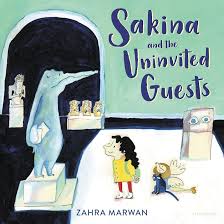Marwan, Zahra
2 Reviews
(1)
K-3
When a sandstorm makes "the city orange -- the sun like a tangerine, the waves like clementine peels," Sakina and her mother spend the day at a museum. While her mother is moved to tears, Sakina is confused by the sculptures of a "chubby crocodile filled with papers," of a jaguar guarding Hammurabi's Code, and of winged lions. She throws herself on the floor in exasperation at "these old, boring, boring things." A few sculptures follow her home, where they cause a ruckus. Sakina realizes the crocodile is stuffed with poems, one of which pleads, "I hope they will remember me." Looking at her grandmother's photo, Sakina cries as she finally understands that the crocodile is a memorial. Watercolor and ink illustrations bring the unnamed city to life as yellow sand-coated landscapes contrast with blue waters, palm trees, and Arabic letters and calligraphic inscriptions that float in the air. Sculptures wink, strut, stretch, and sneak into backpacks. Art (the "uninvited guests") literally comes alive and shows Sakina how the "old" and "boring" can be fascinating and connected to family histories. This imaginative book invites readers to learn more about their heritage through art; the illustrations beg multiple viewings to notice details. An author's note adds context about the ancient artwork and the etymology of the citrus fruit Sakina enjoys.
Reviewer: Julie Hakim Azzam
| Horn Book Magazine Issue:
March, 2025
(2)
K-3
Sometimes the concept of home is complicated. The author presents her own story of emigrating from Kuwait as a child and making a new life in a new country. Marwan's Kuwait is a beautiful place "where one hundred butterflies are always in the sky," her ancestors (represented as a school of fish and two bulls with horns) watch over her, and "my aunties hold me close." However, because her father lacks Kuwaiti citizenship, the entire family is considered stateless, and "people say we don't belong here." They end up migrating from one desert to another--from Kuwait to New Mexico--and despite the sadness of missing family, customs, and a native language, Marwan finds new connections and forges a sense of belonging. New Mexico may not have one hundred butterflies, but it has "new people [who] show me I belong." Culturally symbolic watercolor and ink illustrations are detailed and playful and combine realism with fantasy, creating a delightful landscape of home that is rooted in the specificity of place and Marwan's surreal imagination. A lengthy author's note provides crucial context on the problem of statelessness in Kuwait. A nuanced representation of belonging and citizenship that will ring true for many whose sense of home has never been absolute.
Reviewer: Julie Hakim Azzam
| Horn Book Magazine Issue:
March, 2022
2 reviews
We are currently offering this content for free. Sign up now to activate your personal profile, where you can save articles for future viewing.






